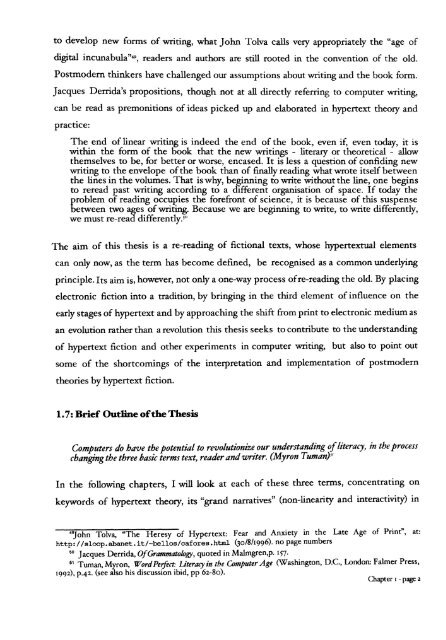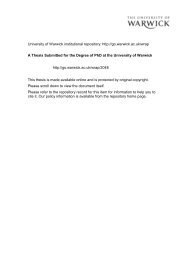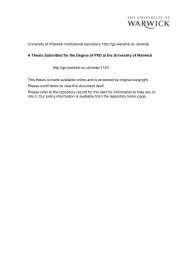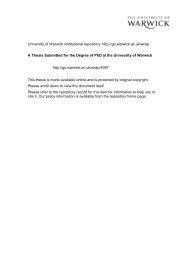From Page to Screen - WRAP: Warwick Research Archive Portal ...
From Page to Screen - WRAP: Warwick Research Archive Portal ...
From Page to Screen - WRAP: Warwick Research Archive Portal ...
Create successful ePaper yourself
Turn your PDF publications into a flip-book with our unique Google optimized e-Paper software.
<strong>to</strong> develop new forms of writing, what John Tolva calls very appropriately the "age of<br />
digital incunabula'w, readers and authors are still rooted in the convention of the old.<br />
Postmodem thinkers have challenged our assumptions about writing and the book form.<br />
Jacques Derrida's propositions, though not at all directly referring <strong>to</strong> computer writing,<br />
can be read as premonitions of ideas picked up and elaborated in hypertext theory and<br />
practice:<br />
The end oflinear writing is indeed the end ofthe book, even if, even <strong>to</strong>day, it is<br />
within the form of the nook that the new writings - literary or theoretical - allow<br />
themselves <strong>to</strong> be, for better or worse, encased. It is less a question of confiding new<br />
writing <strong>to</strong> the envelope ofthe book than of finally reading what wrote itself between<br />
the lines in the volumes. That is why, beginning <strong>to</strong> write withoutthe line, one begins<br />
<strong>to</strong> reread past writing according <strong>to</strong> a different organisation of space. If <strong>to</strong>day the<br />
problem of reading occupies the forefront of science, it is because of this suspense<br />
between two ages ofwriting. Because we are beginning <strong>to</strong> write, <strong>to</strong> write differently,<br />
we must re-read differently."<br />
The aim of this thesis is a re-reading of fictional texts, whose hypertextual elements<br />
can only now, as the term has become defined, be recognised as a common underlying<br />
principle. Its aim is, however, not only a one-way process ofre-reading the old. By placing<br />
electronic fiction in<strong>to</strong> a tradition, by bringing in the third element ofinfluence on the<br />
early stages of hypertext and by approaching the shift from print <strong>to</strong> electronic medium as<br />
an evolution rather than a revolution this thesis seeks <strong>to</strong> contribute <strong>to</strong> the understanding<br />
of hypertext fiction and other experiments in computer writing, but also <strong>to</strong> point out<br />
some of the shortcomings of the interpretation and implementation of postmodern<br />
theories by hypertext fiction.<br />
1.7: Brief OutlineoftheThesis<br />
Computers do have thepotential <strong>to</strong> revolutionize our understanding ofliteracy, in the process<br />
changing the three basic terms text, reader and writer. (Myron Tuman)f'<br />
In the following chapters, I will look at each of these three terms, concentrating on<br />
keywords of hypertext theory, its "grand narratives" (non-linearity and interactivity) in<br />
49John Tolva, "The Heresy of Hypertext: Fear and Anxiety in the Late Age of Print", at:<br />
http://sloop.abanet.it/-bellos/cafores.html fJo/8h996>. no page numbers<br />
50 Jacques Derrida, OfGramma<strong>to</strong>logy, quoted in Malmgren,p. 157·<br />
61 Tuman, Myron, WordPerfect: Literacy in the Computer Age (Washing<strong>to</strong>n, D.C., London: Falmer Press,<br />
1992), P.42. (see also his discussion ibid, PP 62-80).<br />
Chapter I - page 2





